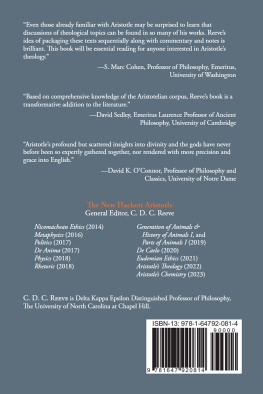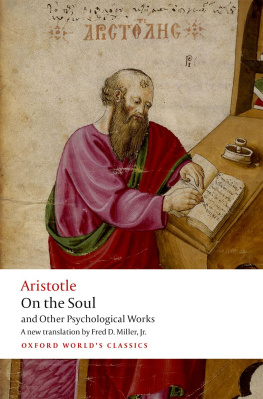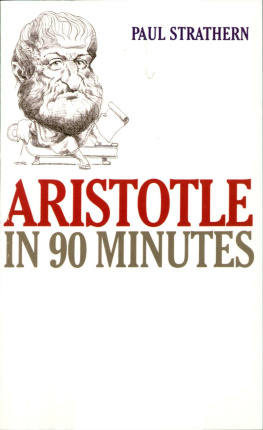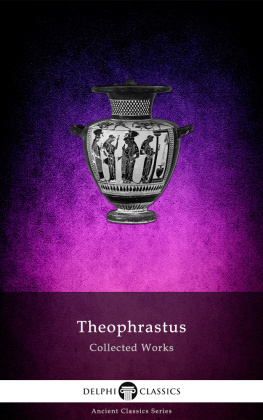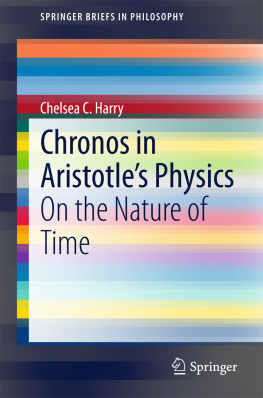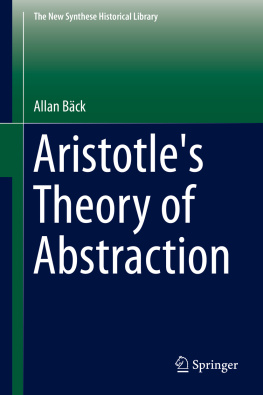Beitrge zur Altertumskunde
Edited by
Susanne Daub
Michael Erler
Dorothee Gall
Ludwig Koenen
Clemens Zintzen
Volume
ISBN 9783110772548
e-ISBN (PDF) 9783110772722
e-ISBN (EPUB) 9783110772791
Bibliographic information published by the Deutsche Nationalbibliothek
The Deutsche Nationalbibliothek lists this publication in the Deutsche Nationalbibliografie; detailed bibliographic data are available on the Internet at http://dnb.dnb.de.
2022 Walter de Gruyter GmbH, Berlin/Boston
I dedicate this volume to the memory of my father Michele (19362019)
Acknowledgments
Many are the friends, colleagues, and scholars to whom I am indebted for all the comments, suggestions, and corrections they have kindly provided over the years. It is impossible for me to name them all here, but I would like everyone to be well aware of my sincere and deep gratitude.
I would, however, like to mention Tiziano Dorandi for having introduced me to the important activities of the Project Theophrastus founded by William W. Fortenbaugh in 1979; Riccardo Chiaradonna, Michael Erler, and Emidio Spinelli for their constant support and interest in my research; again Tiziano Dorandi (with Stephen A. White) and Peter Stork (with, again, Tiziano Dorandi, Johannes M. van Ophuijsen, Tazuko van Berkel, Mariska Leunissen, and Dimitri Gutas) for having allowed me to use their editions of the textual reliquiae of Clearchus and Eudemus before publication; Sergio Knipe (and Michael McOsker) for their essential help with the English language. I also wish to acknowledge Flavia Palmieris invaluable assistance in preparing the indexes of the volume.
My gratitude also goes to all the libraries and institutions that have facilitated my studies, and the writing and reworking of the following chapters.
My heartfelt thanks also go to Michael Erler again and to the Herausgebergremium of the Beitrge zur Altertumskunde for welcoming this book into the series.
I would like to point out that this volume is the result of research activities carried out within the University Project (Years 20192021) Il criterio di verit: Dalla filosofia antica allepistemologia contemporanea funded by Sapienza University of Rome.
Finally, it goes without saying that I remain solely responsible for any errors, misprints and inaccuracies present in this work.
Rome, November 2021 | Francesco Verde |
Introduction: Some Remarks on the Historical Meaning of the Hellenistic Peripatos
As it is recounted both in ancient sources and by modern scholars, |
the history of the Peripatetic School after Aristotle and Theophrastus |
may be summed up in one word: decline. |
(: 135) |
This book is devoted to some Peripatetic philosophers who were Aristotles direct and indirect pupils, or at any rate heirs,
The specific aim of this volume is not only or not so much to reconstruct certain aspects of the doctrines developed by the philosophers belonging to this tradition, but also and especially to consider these thinkers from a comparative perspective within the more general context of philosophy in the Hellenistic Age. In this period, interactions between the various schools (often for polemical purposes) were very common, and they are so significant that they frequently help to explain intellectual developments and course corrections in the philosophy of a school or thinker.
The most widely-investigated polemical relations are those between Stoics and Epicureans and between Stoics and Academics, especially in the late 3rd and early 2nd centuries BC. a turn that marked a deep break in the history of the Platonist tradition , in Zenos school and even in Epicurus one divergences among disciples, while certainly to be found, seem somewhat less severe than those marking the Hellenistic Peripatos.
Antiochus of Ascalon, for example, was well aware of this distinctive feature of Aristotles school, at least judging from the testimony provided by Ciceros Academica. In the Varro (3334 = Strato 8B Sharples), Antiochus spokesman, Varro, explicitly states that his philosophy brings together philosophical doctrines that are only apparently different and heterogeneous. Antiochus philosophical syncretism, based on Platos authority more than Socrates, rests on the doctrinal unity between the Platonist Old Academy (at least up to Polemo, and with the obvious exception of Arcesilaus and his successors, down to Philo of Larissa) and the Peripatos, which is to say Aristotle and Theophrastus (but see Cic. Fin. V 5, 12 = Theophr. 498 FHS&G), but clearly excluding Strato of Lampsacus (Nam Strato eius auditor quamquam fuit acri ingenio tamen ab ea disciplina omnino semovendus est). While there are various reasons for this exclusion, it is quite evident that in Antiochus eyes Stratos philosophy was in certain respects difficult to reconcile with Aristotle on account of its marked naturalistic interests, reflecting a problematic relationship with the Atomists materialism (as Cicero himself acknowledges in Lucullus, 121 = 18 Sharples). Strato is only one among many examples that could be invoked within the context of the Hellenistic Peripatos.
Stratos case clearly shows that the central problem in the analysis of Hellenistic Peripatetic philosophers concerns both their faithfulness to Aristotle and their essentially marginal position, not only in modern scholarship but also in Antiquity, as Antiochus interpretation somehow seems to confirm. The issue of the Hellenistic Peripatos marginality is a complex one and in my view, this concept does not at all correspond to decadence, as some scholars have argued (see below, n. 21). It is undeniable that the extremely fragmentary condition of the texts makes it most difficult to appreciate the importance of Aristotles heirs; yet it is equally undeniable that the Hellenistic stage was chiefly dominated by Epicureanism, Stoicism, and the sceptical Academy.
The problem of faithfulness to Aristotle concerns the legal status of the philosophical school in the Hellenistic Age, a controversial and widely-debated issue.
As far as Peripatos chronology is concerned, it is very difficult to reconstruct the succession of scholarchs for the mother-school of Athens owing to the scanty surviving evidence. The sequence Theophrastus, Strato, and Lyco seems plausible. Lycos death can probably be placed between 226/225 and 225/224;
The available data do not allow us to determine whether or not an official Peripatetic school was still in existence up until the end of the Hellenistic Age, namely the Lyceum founded by Aristotle; it is most likely, for example, that the Peripatetic Cratippus, whom Cicero held in great esteem, was the head of a sort of private school or circle inspired by Aristotelian philosophy.
Now, given the nature of ancient philosophical schools as venues for debate, it is hardly surprising that Critolaus ethical doctrines verged on Stoicism
The history of Hellenistic schools is also particularly interesting for another reason: the context no doubt promoted open doctrinal debate within these school, but at the same time, the cases of certain philosophers leaving one current of thought for a completely different one suggest that each school nonetheless had its own particular doctrinal orientation (albeit not a dogmatic one) which was constituted by its founders writings and thought. Take Dionysius of Heraclea, for instance: a pupil of Zenos, he later joined the Cyrenaics (Diog. Lart. VII 167 =



